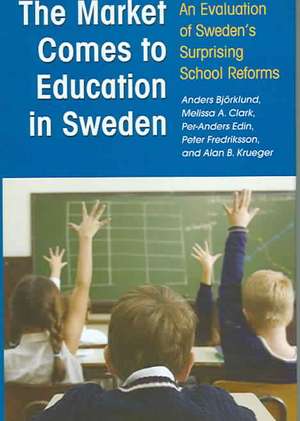The Market Comes to Education in Sweden: An Evaluation of Sweden's Surprising School Reforms
Autor Anders Bjorklund, Melissa A. Clark, Per-Anders Edin, Peter Fredricksson, Alan B. Kruegeren Limba Engleză Hardback – 8 ian 2006
A large central government providing numerous public services has long been a hallmark of Swedish society, which is also well-known for its pursuit of equality. Yet in the 1990s, Sweden moved away from this tradition in education, introducing market-oriented reforms that decentralized authority over public schools and encouraged competition between private and public schools. Many wondered if this approach would improve educational quality, or if it might expand inequality that Sweden has fought so hard to hold down. In The Market Comes to Education in Sweden, economists Anders Björklund, Melissa Clark, Per-Anders Edin, Peter Fredriksson, and Alan Krueger measure the impact of Sweden's bold experiment in governing and help answer the questions that societies across the globe have been debating as they try to improve their children's education. The Market Comes to Education in Sweden injects some much-needed objectivity into the heavily politicized debate about the effectiveness of educational reform. While advocates for reform herald the effectiveness of competition in improving outcomes, others suggest that the reforms will grossly increase educational inequality for young people. The authors find that increased competition did help improve students' math and language skills, but only slightly, and with no effect on the performance of foreign-born students and those with low-educated parents. They also find some signs of increasing school segregation and wider inequality in student performance, but nothing near the doomsday scenarios many feared. In fact, the authors note that the relationship between family background and school performance has hardly budged since before the reforms were enacted. The authors conclude by providing valuable recommendations for school reform, such as strengthening school evaluation criteria, which are essential for parents, students, and governments to make competent decisions regarding education. Whether or not the market-oriented reforms to Sweden's educational system succeed will have far reaching implications for other countries considering the same course of action. The Market Comes to Education in Sweden offers firm empirical answers to the questions raised by school reform and brings crucial facts to the debate over the future of schooling in countries across the world.
Preț: 266.35 lei
Nou
Puncte Express: 400
Preț estimativ în valută:
50.96€ • 53.36$ • 42.17£
50.96€ • 53.36$ • 42.17£
Carte indisponibilă temporar
Doresc să fiu notificat când acest titlu va fi disponibil:
Se trimite...
Preluare comenzi: 021 569.72.76
Specificații
ISBN-13: 9780871541406
ISBN-10: 0871541408
Pagini: 177
Dimensiuni: 152 x 229 x 20 mm
Greutate: 0.41 kg
Editura: Russell Sage Foundation
Colecția Russell Sage Foundation
ISBN-10: 0871541408
Pagini: 177
Dimensiuni: 152 x 229 x 20 mm
Greutate: 0.41 kg
Editura: Russell Sage Foundation
Colecția Russell Sage Foundation
Notă biografică
ANDERS BJÖRKLANDis professor of economics in the Swedish Institute for Social Research at Stockholm University. MELISSA A. CLARK is Visiting Lecturer at Mathematica Policy Research, Inc. and teaches masters and doctoral students in the Woodrow Wilson School of Public and International Affairs at Princeton University. PER-ANDERS EDIN is professor in the Department of Economics at Uppsala University. PETER FREDRIKSSON is associate professor in the Department of Economics at Uppsala University. ALAN B. KRUEGER is Bendheim Professor of Economics and Public Policy in the Economics Department and Woodrow Wilson School at Princeton University.
